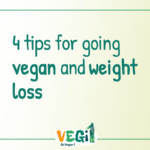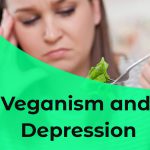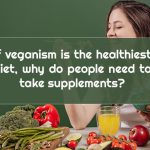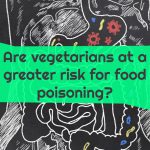Can going vegan decrease testosterone levels in males?
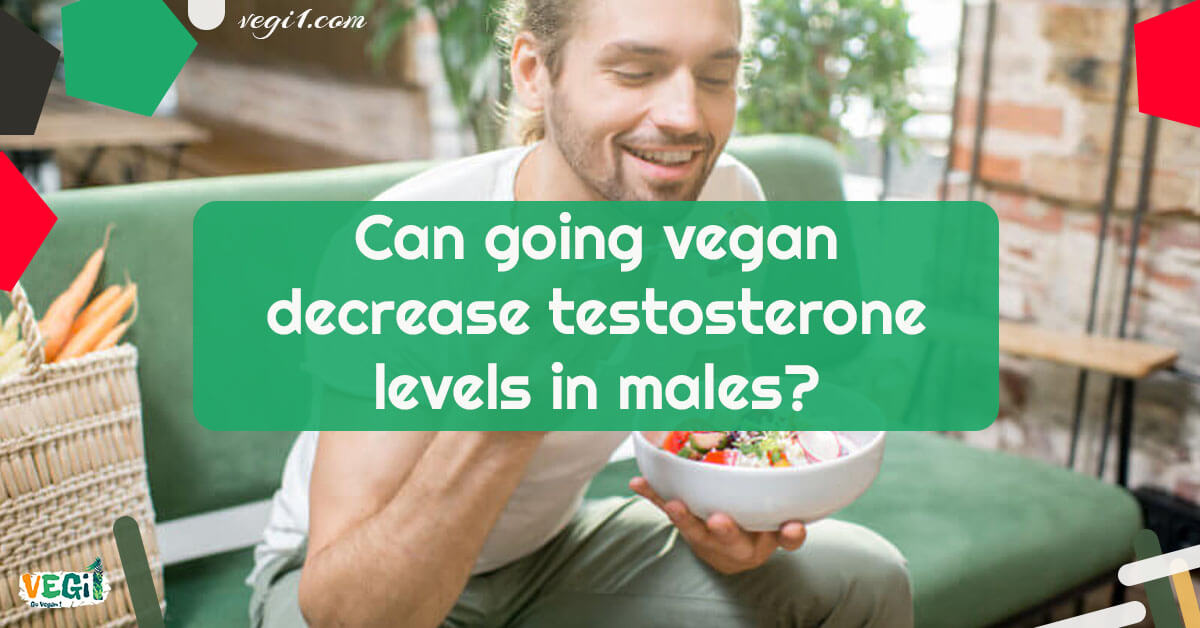
Can going vegan decrease testosterone levels in males?
Though it’s gaining popularity, is veganism suitable for everyone? Concerns concerning the impact of being vegan on testosterone levels may be more prevalent in men In this blog post, I’ll look at how a vegan diet can impact male hormones, specifically testosterone levels. We’ll examine the available research, assess the advantages and disadvantages of a vegan lifestyle, and speculate on how overall testosterone levels may be impacted.
Are you a male considering becoming a vegan? If so, you might be curious to find out how your testosterone levels might change if you ate a plant-based diet. The question of whether avoiding meat and dairy would affect this important hormone is reasonable. We’ll review the most recent studies on the subject and discuss the potential benefits and drawbacks of leading a vegan diet. We will also answer the main question: Can going vegan decrease testosterone levels in males?‘ Let’s delve in and discover everything we can about the meatless man!
In this article you will read:
What is testosterone?
Male sex traits are developed as a result of the hormone testosterone, which is largely produced in the testes and is essential for preserving male health throughout life. Maintaining muscular mass, bone density, and libido as well as encouraging the generation of sperm and red blood cells all depend on testosterone.
What is a normal testosterone level?
Based on my research testosterone levels can vary greatly among individuals, making it essential to understand what is considered a normal testosterone level. The range of what is considered normal can vary slightly depending on the laboratory and testing method used, but generally, the average testosterone level in adult males ranges from about 300 to 1000 nanograms per deciliter (ng/dL).
It’s important to note that testosterone levels naturally decline with age, so what may be considered a normal level for a 50-year-old may be lower than what is normal for a 25-year-old.
Additionally, testosterone levels can fluctuate throughout the day, with the highest levels occurring in the morning and lower levels in the evening.
How is testosterone generated inside the body?
I can say that like all hormone production, testosterone production begins in the brain, namely in the hypothalamus. When the body needs to create testosterone, the brain determines and informs the pituitary gland. The pituitary gland subsequently conveys this request to the testes (or the ovaries in women) after receiving this directive. Although the testicles produce the majority of testosterone, the adrenal gland, a little gland above the kidneys, also contributes some. The production of testosterone would be impossible without some nutrients. These consist of:
-
Cholesterol
Pregnenolone, a crucial component of testosterone, is created from cholesterol as part of the hormone manufacturing process.
Despite the fact that vegan diets forgo animal sources of cholesterol (which may be one reason why some people believe a plant-based diet lowers testosterone levels), the body can produce all the cholesterol it requires for normal bodily functions without consuming any additional cholesterol. By preventing the ingestion of cholesterol, a vegan diet won’t lower testosterone levels.
The Impact of a Vegan Diet on Cholesterol Levels
-
Zinc
Zinc impacts testosterone levels by reducing the conversion of testosterone to estrogen. Since the body cannot produce zinc, it’s crucial to get the appropriate daily intake from foods like beans, nuts, legumes, and supplements, if necessary.
Foods High in Zinc for Vegetarians and Vegans
-
Vitamin D
There is evidence from studies that testosterone levels and vitamin D levels are related. The best source of vitamin D is sunlight, while it can also be found in some foods including fortified juice, mushrooms, fortified tofu, rice milk, soy milk, fortified breakfast cereal, and UV-treated mushrooms, as well as taken as a supplement.
What Vegetarian Foods Are High in Vitamin D
-
Magnesium
Age-related binding of testosterone to SHBG (sex hormone binding globulin) prevents it from operating to its full potential. The testosterone will bind to magnesium when there is enough of it in the body, though.
If your diet isn’t high in plants, consume lots of nuts, beans, and dark, green, leafy vegetables as these are among the items that are easiest to overdose on magnesium.
Foods High in Magnesium for Vegetarians and Vegans
-
A vitamin
Sperm production benefits from vitamin A. My studies have showed that testosterone levels fall and estrogen levels actually rise when vitamin A is not present in testicular cells. Carrots, kale, broccoli, cantaloupe, apricots, and winter squash are excellent sources of vitamin A.
64 Vitamin A Rich Foods for Vegetarians and vegans
-
Healthy Fats
The need of enough omega-3 fatty acids, monounsaturated fats, and even saturated fats in testosterone generation and function can be attributed to their importance for proper hormone functioning.
It’s especially crucial for males who consume plant-based diets to receive enough of the proper kinds of fats (as indicated above, and minimize the poly-unsaturated form) because vegan diets are frequently naturally low in fat.
Another explanation for why vegan diets are linked to low testosterone is that they don’t include enough fat to facilitate the creation of testosterone. Olive oil, coconut oil, avocados, nuts, seeds, and coconut all contain testosterone-supporting lipids.
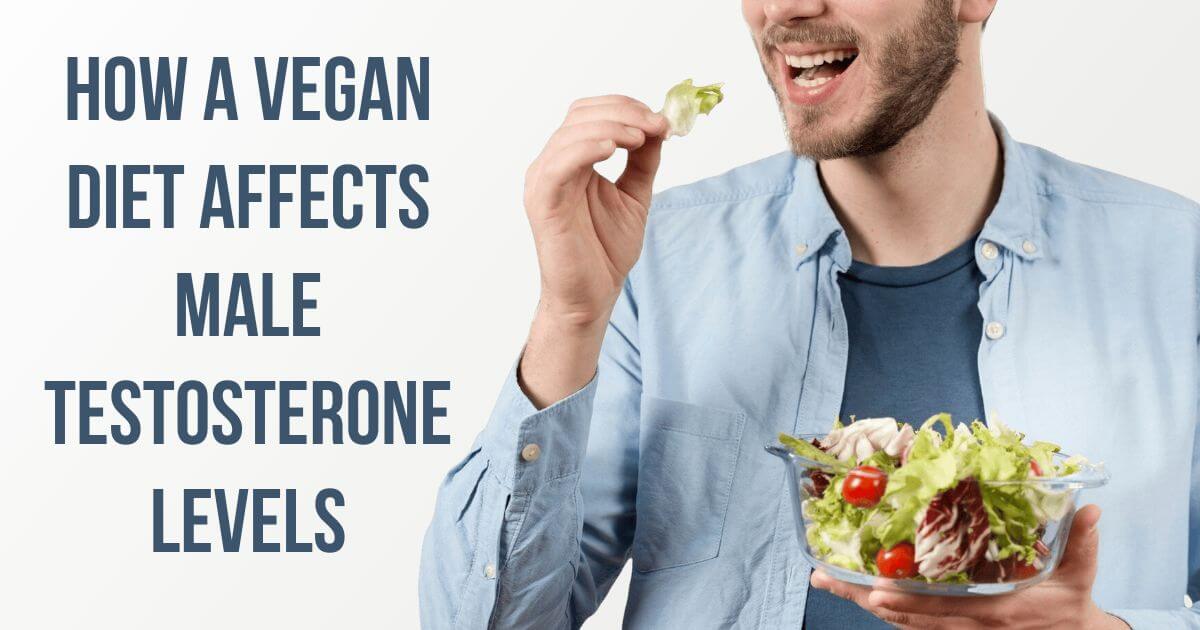
Can going vegan decrease testosterone levels in males?
There has been a persistent myth that eating a vegan diet can suppress your testosterone levels for a long time. Most males typically imagine a small, fragile individual with low body mass when they think of people who adopt a vegan diet, and they presume that vegans are not getting enough nutrients to sustain optimal testosterone levels. But it isn’t always the case. Vegan diets have shown tremendous potential in raising testosterone levels compared to other diets.
Regular use of saturated fats in Western diets can result in unhealthy weight gain, which has been demonstrated to lower testosterone, as well as an increase in body fat.
According to studies, the majority of obese men had testosterone levels that were 30% lower than those of men with average body weight. Conversely, a vegan diet can help you get slimmer, which can help your testosterone levels rise. Men on vegetarian diets who had a lower body mass index (BMI) also had a 13% greater testosterone concentration than meat eaters, according to research on veganism and its impact on testosterone.
What does a vegan consume to keep their testosterone levels in check?
In this section, I’ll briefly go through a number of vegan foods that can raise men’s testosterone levels and talk about other methods by which men can further balance and maintain their testosterone levels while following a vegan diet.
Why does testosterone level decrease in men
In spite of the fact that every man will undergo a decline in testosterone production as he gets older, exogenous influences can also lower testosterone levels. The primary offenders are:
- Anxiety and stress: The body produces large amounts of cortisol when we are under stress or anxiety. Cortisol, also known as “the stress hormone,” offers your body the energy it needs to fight or run while also squelching the release of other hormones, such as testosterone.
- Excessive physical activity: In this instance, there is “too much of a good thing.” In fact, very long-term, intense activity can lower testosterone levels. The extended release of cortisol, which is also present when you engage in physically demanding activities, is thought by scientists to be the cause.
- Bad sleep: Studies have shown that regular, uninterrupted REM sleep is necessary for the creation of testosterone; however, stress, hectic schedules, parenting, and other daily responsibilities can interfere with this necessary sleep, causing testosterone levels to plummet.
- Being Overweight: An enzyme found in body fat transforms testosterone into estrogen. More testosterone is pushed aside by excess body fat (nutrient deficiency also contributes; more on that later).
- Medications: The side effect of testosterone suppression is one that every drug has. Chemotherapy drugs, some antidepressants, and prescription anti-fungal medications are frequently at fault; this is something to keep in mind while you follow a doctor’s orders.
- A pituitary gland disorder: Do you still recall how the pituitary gland produces testosterone? This important gland’s capacity to aid in the production of testosterone may be compromised when it develops a disease or is dysfunctional.
- Poor diet and vitamin deficiency: It should come as no surprise that important bodily processes like the generation of hormones are influenced by what we eat (or don’t consume), as diet is critical to general health. Low testosterone levels have been linked to low vitamin D levels in particular. Please add that this is accurate whether one follows a vegan or omnivorous diet. A poor vegan diet is just as possible as a poor Westernized diet.
- Alcoholic beverages: Drinking with the boys can actually make you seem less manly. It has been demonstrated that drinking too much alcohol, specifically 7.7 ounces per day, causes testosterone production to plummet.
What foods reduce testosterone levels (list of prohibited foods)
Certain foods have been suggested to potentially lower testosterone levels in males. While more research is needed to fully understand the effects of these foods on testosterone, it is worth exploring this topic for those concerned about their hormone levels while following a vegan diet.
-
Flaxseeds:
Flaxseeds are rich in lignans, another type of phytoestrogen. Despite the fact that lignans have a number of health advantages, some research indicates that excessive lignan intake may cause reduced testosterone levels. To determine the specific effect of flaxseeds on testosterone levels and whether moderate use is problematic, more research is required.
-
Mint:
Mint is a commonly used herb that is believed to have anti-androgenic effects. Anti-androgens are chemicals that can stop testosterone’s effects on the body. While there is little information on the precise effects of mint on testosterone levels, several studies have found anti-androgenic effects from excessive mint use. However, the impact of moderate mint consumption on testosterone levels is unclear and requires further investigation.
-
Licorice root:
The component licorice root is frequently used to sweeten candies and liquids. It’s a well-known natural remedy in holistic medicine as well, and it works for everything from common colds to chronic pain. According to my most recent research, licorice may also have an impact on hormone levels, possibly resulting in a steady drop in testosterone. In a 2003 study, testosterone levels fell by 26% after just one week when 25 males took 7 grams of licorice root daily.
-
Alcohol:
Excessive alcohol consumption has been shown to have various negative effects on health, including potential disruptions in hormone production. Research suggests that chronic heavy drinking may lead to decreased testosterone levels. However, moderate alcohol consumption is not associated with significant changes in testosterone levels.
What consequences might low testosterone have?
Men (and women) can have a wide range of symptoms from low testosterone because of its extensive spectrum of functions, including:
- reduced libido
- Erectile dysfunction and low semen output
- more body fat
- fewer muscles
- fatigue and sleep issues
- difficulty concentrating
- Feeling depressed
If you’re exhibiting any of these signs, it may be time to schedule a testosterone level check with your doctor. If they are deemed to be low, there are many natural and medically approved ways to raise testosterone levels.
How to raise testosterone naturally
There are several actions you can do that are under your control if you need to raise low testosterone, including:
- Regular exercise
- Boost the size of your muscles
- Eat a balanced diet.
- Obtain the necessary dosages of vitamin D.
- If you don’t get enough of a certain nutrient, take a vitamin supplement.
- Put sleep first.
- Learn to control your worry and stress
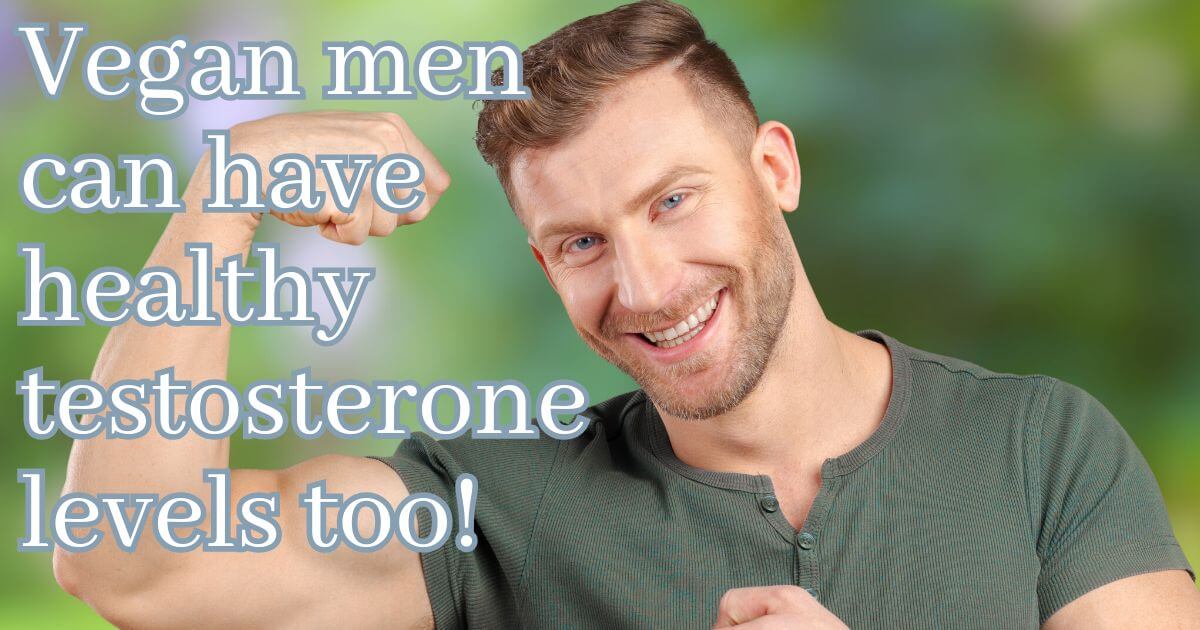
How does veganism affect male hormones?
Even though there hasn’t been much research explicitly looking at how veganism affects male hormones, it’s vital to think about how a plant-based diet can alter testosterone levels. By giving up all animal products, you may be eating less saturated fat and cholesterol as a result of going vegan.
According to some research, these minerals, which are prevalent in animal products, may have a favorable impact on testosterone production.
However, A well-planned vegan diet can provide all the necessary nutrients for optimal testosterone levels. Plant-based foods rich in protein, such as legumes, tofu, and tempeh, can help support testosterone production. Additionally, incorporating foods high in zinc, like nuts and seeds, and ensuring adequate vitamin D intake from fortified plant-based milks or sunlight exposure, can also contribute to maintaining healthy hormone levels. It is important to note that factors beyond diet, such as exercise, stress levels, and overall health, can impact testosterone levels as well.
So, while veganism may potentially have an effect on male hormones, it is just one piece of the puzzle. Consulting with a healthcare professional or registered dietitian can help ensure that you are meeting your specific nutritional needs while following a vegan lifestyle.
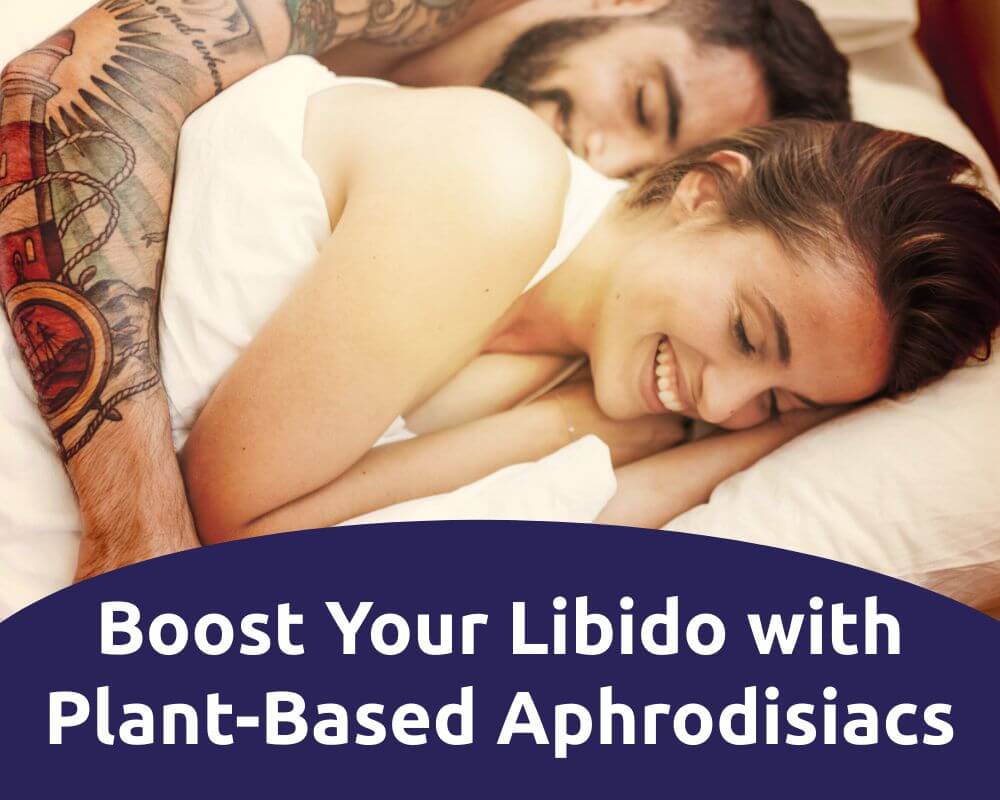
What plant foods increase testosterone levels?
Many men believe that vegetarians have limited options for nutrients that increase testosterone. But that isn’t the case at all. You can drastically raise your testosterone by including a number of foods and particular components in your vegan diet.
You can add the following vegan foods to your shopping list for your upcoming trip to the supermarket:
-
Pumpkin Seeds
Pumpkin seeds, which are high in zinc, also include protein, iron, omega-3 fatty acids, and other vital elements that can support your body’s natural testosterone synthesis. The zinc and omega-3 fatty acid content of pumpkin seeds is particularly significant since zinc supports a healthy metabolism and reproductive function and omega-3 fatty acids can raise testosterone levels. Pumpkin seeds are also excellent sources of tryptophan, an essential amino acid needed to make serotonin, a neurotransmitter that is known to help control mood and anxiety.
-
Chia seeds
Your testosterone levels can be greatly raised by eating chia seeds, which are a great source of omega 3s and essential fatty acids (EFA). Chia seeds also contain potassium, iron, zinc, and magnesium, which can support metabolism, blood pressure, mood, and glucose levels. If you want to enhance your testosterone while following a vegan diet, many of these nutrients are also important for sustaining your energy and hormone synthesis.
-
Broccoli
As men get older, their estrogen levels can rise and interfere with the production of testosterone. Consuming cruciferous vegetables, such as broccoli, can help with that, though. Indole 3 is a substance found in broccoli that acts as an antioxidant to break down and remove extra estrogen from the human body, which may help increase free testosterone levels.
Cooking a few broccoli stems to serve as a side dish with your daily meal is undoubtedly the way to go if you’re seeking fora vegan diet supplement to boost testosterone.
-
Avocados
Avocados are a popular vegan meal that you should take into account. These nutrient-dense veggies (or fruits, depending on your perspective) include high levels of folic acid, which can help reduce cortisol and raise testosterone. They are also rich in healthy fats. Avocado lipids can also aid in lowering LDL cholesterol, which can prevent the creation of testosterone in your body. Furthermore, boron, which has been linked to supporting healthy testosterone metabolism and preventing testosterone breakdown, is abundant in avocados.
Avocados, one of the decade’s most popular foods, are ideal for anyone wishing to assemble a vegan diet that can increase testosterone.
-
Garlic
Garlic can help increase your testosterone in addition to flavoring some of your favorite foods. Garlic can help reduce high cortisol levels, which have been shown to diminish testosterone levels, according to a number of studies. The hormone that regulates the brain’s stress response is cortisol. Studies suggest that garlic may encourage the pituitary gland’s release of the hormone luteinizing hormone (LH), which in turn may raise the testicles’ synthesis of testosterone. As a result, garlic may aid in raising your testosterone levels while also defending it against too much cortisol.
For males who experience erectile dysfunction due to insufficient testosterone, garlic also enhances blood circulation and reproductive health.
-
Coconut Oil
Coconut oil can be a terrific addition to your cabinet if you’re a vegan who is serious about creating a diet that can keep your testosterone in check. Medium-chain triglycerides (MCTs), which can aid in calorie burning and weight management, are abundant in coconut oil.
Using coconut oil to cook with your meals can be beneficial if you want to lose weight and raise your testosterone levels because studies show that having a lower body mass index can assist in enhancing testosterone levels.
24 Plant-base sources that increase libido for vegans
Does soy increase or decrease testosterone?
This one might be a little challenging. It is true that soy includes isoflavones, phytoestrogens that can function as an estrogen substitute and stimulate the body’s estrogen receptors. The isoflavones often have a weak connection with estrogen receptors, making it impossible for them to increase your estrogen levels. In some circumstances, soy’s isoflavones may even contribute to lowering estrogen synthesis and preventing the rise in estrogen levels.
You can have a soy-based diet without being concerned about your testosterone levels dropping because studies have shown that soy has no discernible effect on your testosterone levels. Although soy doesn’t raise your testosterone levels, it is still a healthy alternative to a diet that is focused primarily on meat because it is a full source of protein and contains many of the important amino acids required by the body.
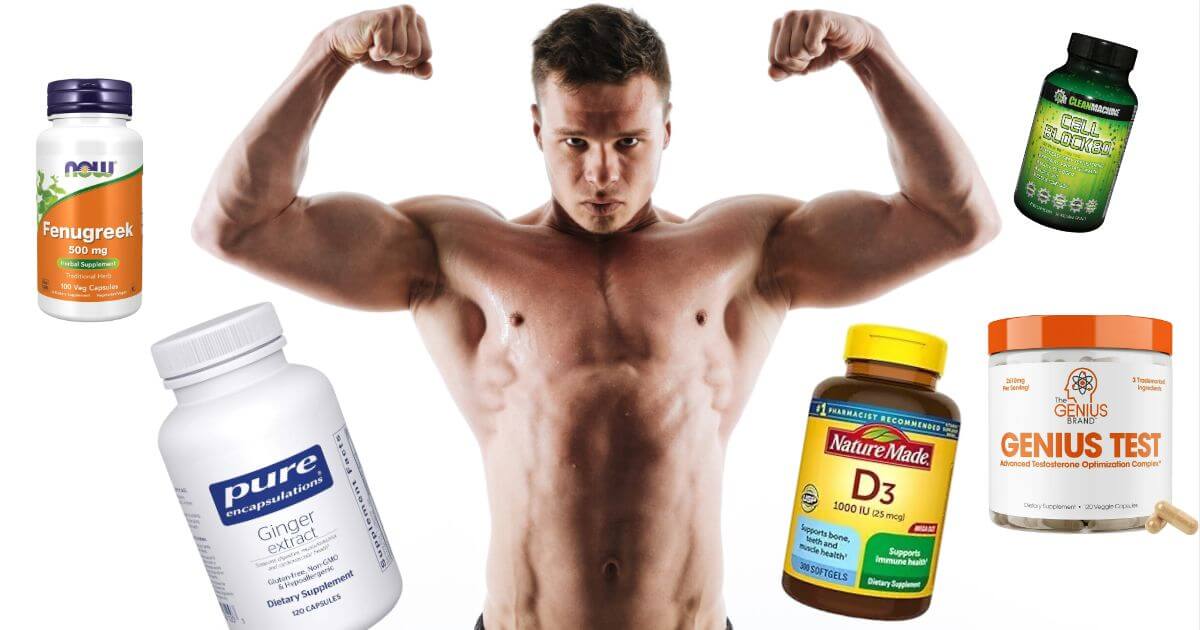
Vegan Testosterone Supplements
It has been discovered that the ingredients in testosterone booster pills maintain regular testosterone levels.
Many of these items contain a mix of herbal extracts or specific nutrients that assist hormone balance.
Furthermore, some of them contain substances that either directly increase testosterone or related hormones or prevent your body from converting testosterone to estrogen.
Ashwagandha extract and fenugreek are two components found in The Genius Brand Genius Test that are intended to balance hormone levels and increase testosterone levels.
While some customers might prefer supplements that contain both nutrients and herbal ingredients, others might think a supplement with just one component is best.
When exposed to sunlight, your body produces vitamin D, a fat-soluble vitamin. People who get minimal sun exposure may have low vitamin D levels.
Another well-known herb-based option that might support normal testosterone levels is fenugreek, however further research is required.
In one of my studies, testosterone levels significantly increased in males taking 600 mg of fenugreek extract daily for 12 weeks, and their sexual function significantly improved when compared to guys taking a placebo.
Ginger is a typical cooking spice that has long been used in alternative medicine.
It appears to have a number of potential health benefits, including reducing inflammation and cholesterol. My rat studies revealed that it might also increase testosterone.
Finally
We examined the subject of veganism and its potential effect on male testosterone levels in this blog post. We talked about what a normal testosterone level is and how testosterone plays a part in preserving male health. The issue of whether turning vegan can lower testosterone levels in men was then discussed, taking into account the potential dietary deficiencies in a plant-based diet. Additionally, we talked about some foods that may suppress testosterone levels.
A well-planned vegan diet can include all the elements required for appropriate hormone levels, even if there is little study explicitly looking at how a vegan diet affects testosterone levels. Protein, zinc, and vitamin D-rich plant diets can boost the creation of testosterone. In addition, lifestyle elements like physical activity, stress levels, and general health might affect testosterone levels.
I hope the article on the topic of Can going vegan decrease testosterone levels in males?
Be useful for you, and you can make delicious yogurts for yourself. If you are satisfied with this article, please give us five stars and leave a comment for us. Thank you



